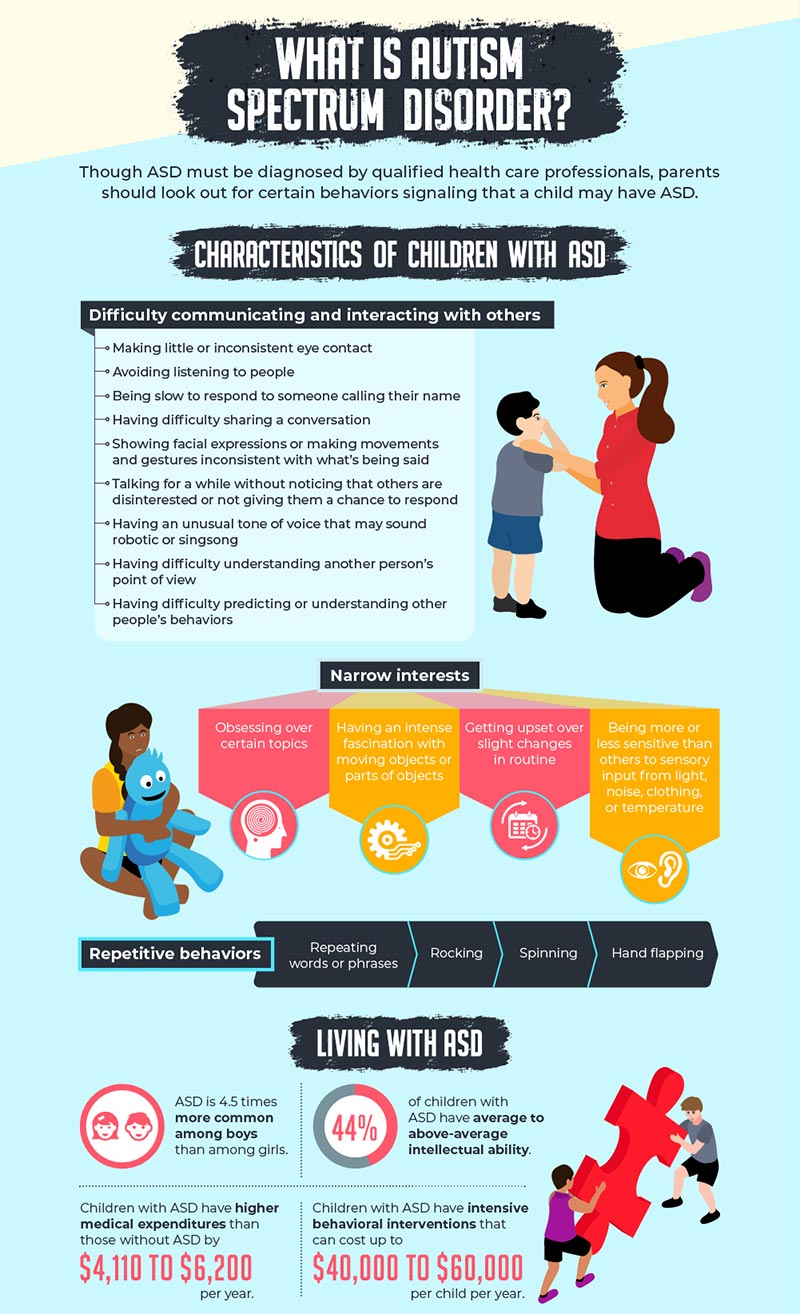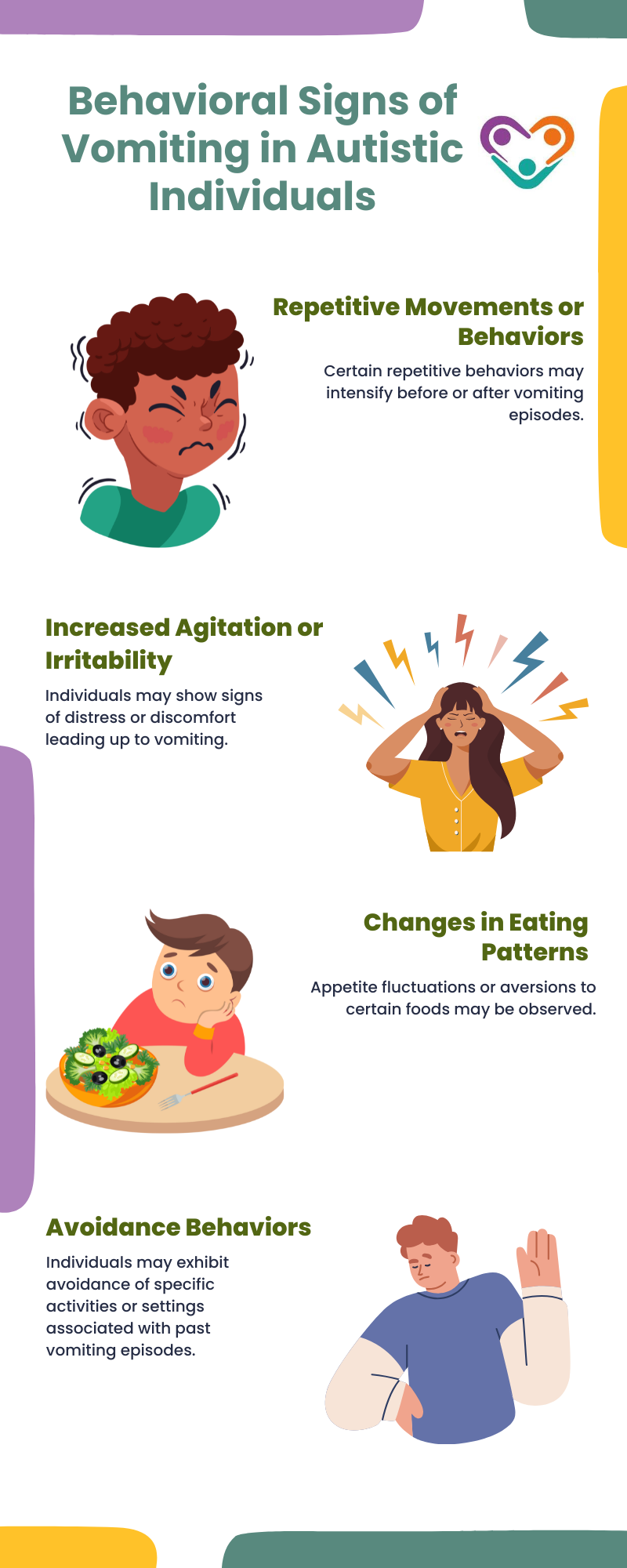How peer relationships can improve with guidance from Autism Spectrum Therapies specialists
How peer relationships can improve with guidance from Autism Spectrum Therapies specialists
Blog Article
Key Indications and Signs And Symptoms to Acknowledge in People With Behavior Autism
When you experience a person with behavioral autism, recognizing crucial symptoms and signs is important. You might discover difficulties in social interactions and communication, as well as a strong need for routines. Additionally, sensory level of sensitivities can bring about overwhelming experiences. Recognizing these traits can boost your assistance and interventions, however there's even more to reveal regarding exactly how these behaviors show up in day-to-day scenarios. Let's discover what these indications truly look like.
Challenges in Social Interactions
When you interact with a person on the autism spectrum, you could discover they struggle with social signs and communication. These obstacles can make social interactions really feel overwhelming for them. You might see them preventing eye contact or standing as well close or too far during discussions, which can produce misunderstandings. They may not notice body movement or facial expressions, making it harder for them to assess how others are really feeling.
When they do involve, they could chat concerning their interests in terrific information without seeing if you're interested. Recognizing these challenges can help you come close to communications with compassion and perseverance, fostering a more comfortable environment for both of you.
Difficulty With Verbal and Non-Verbal Communication

Identifying these indications is necessary, as it helps you much better support and involve with individuals on the autism range. By understanding their interaction obstacles, you can foster a lot more purposeful connections and supply an extra supportive environment.
Repeated Behaviors and Routines
Communication obstacles frequently go along with various other indicators of autism, such as repetitive behaviors and a strong preference for routines. You may observe that people with autism often engage in particular, repeated actions, like hand-flapping, shaking, or duplicating expressions. These actions can give convenience and a feeling of control in a frequently overwhelming world.
When they comply with a structured routine,Routines are equally important; many individuals flourish. You may find that changes to these regimens can bring about substantial distress. If they have a daily ritual of consuming breakfast at a specific time or complying with a specific route to school, any kind of interruption can trigger anxiety.
Identifying these patterns assists you understand their behavior and supply support. By accommodating their demand for routine and permitting repeated actions, you can develop a much more comfy atmosphere that eases their obstacles.
Sensory Sensitivities

Typical Sensory Triggers
Sensory level of sensitivities can substantially impact every day life for people with autism, as certain stimulations often activate frustrating reactions. Typical sensory triggers consist of loud noises, brilliant lights, and strong scents. You may notice that abrupt audios, like alarms or alarms, trigger anxiety or distress. Fluorescent lighting in stores can feel uncomfortable and severe. Structures can additionally play a significant role; rough materials or specific food appearances might be excruciating for you. Additionally, crowded places can overwhelm your senses, making it hard to focus or unwind. Understanding these triggers can help you manage your environment better. By knowing what affects you, you can take steps to reduce discomfort and enhance your daily experiences.
Behavior Feedbacks Explained
Understanding your behavioral responses to sensory sensitivities is essential, as they often reveal how you interact with the globe. You could observe that specific noises, lights, or appearances overwhelm you, causing stress and anxiety or pain. When confronted with these stimuli, you may withdraw, cover your ears, and even respond strongly. These reactions aren't simply quirks; they're your means of dealing with overstimulation. You may additionally discover yourself looking for particular sensory experiences, like deep stress or peaceful environments, to aid ground yourself. Recognizing these patterns assists you understand your demands much better and can guide just how you communicate them to others. By recognizing your sensory sensitivities, you can function towards developing an atmosphere that really feels a lot more comfortable and convenient for you.
Coping Techniques Introduction
Recognizing your sensory sensitivities is just the initial step; now it's time to explore coping methods that can aid you manage those experiences successfully. Beginning by creating a sensory toolkit tailored to your requirements. This can consist of noise-canceling earphones, anonymous fidget toys, or relaxing fragrances. Establishing an organized regimen can also offer predictability, minimizing anxiousness around sensory overload. Take breaks in a quiet space to regroup when you feel overwhelmed. Practicing mindfulness techniques like deep breathing can help ground you in the moment. Furthermore, connect your needs with those around you; having encouraging family and friends can make a huge distinction. Bear in mind, locating what functions finest for you may take some time, so be patient and open to trying new approaches.
Restricted Interests and Emphasis
While lots of individuals establish a wide variety of passions, those with autism commonly demonstrate restricted passions and an intense concentrate on certain topics. You may see that somebody with autism can spend hours delving into their preferred subject, whether it's a certain sort of train, a certain motion picture, or a scientific idea. This extreme emphasis isn't just a hobby; it can come to be a main component of their identity and social interactions.
You may discover that discussions revolve around these rate of interests, and they might struggle to engage in wider subjects. click to read more By recognizing and acknowledging these restricted rate of interests, you can cultivate a supportive atmosphere where they really feel valued and recognized, permitting for more meaningful connections and communications.
Psychological Law Difficulties
People with autism usually encounter obstacles in emotional policy, which can be influenced by their intense concentrate on specific interests. You might see that when an individual is deeply engaged in a recommended task, they can experience solid feelings, whether exhilaration or stress. When points do not go as prepared., this intensity occasionally makes it difficult for them to shift equipments or handle their feelings - Autism Spectrum Therapies.

Irregularity in Developmental Turning Points
When it comes to developing landmarks, you'll notice special info that people with autism frequently show a wide range of variability. You could see a youngster succeed in language abilities however struggle with social interactions.
It's important to recognize that each individual's trip is one-of-a-kind. Some might establish complicated skills early, only to encounter obstacles in the future. Others may take longer to achieve basic landmarks yet after that flourish in particular areas. Observing these patterns can aid you recognize their staminas and needs much better.
Frequently Asked Questions
Just How Is Autism Detected in Children and Adults?
To detect autism in adults and kids, specialists evaluate behavior, interaction skills, and social interactions. If an individual meets the requirements for autism range disorder., they usually use standardized examinations, meetings, and monitorings to determine.
Exist Various Sorts Of Autism Range Disorders?
Yes, there are different sorts of autism spectrum problems, consisting of Asperger's disorder and prevalent developmental disorder-not otherwise specified. Each type varies in intensity and features, so recognizing these differences can help you better assistance individuals with autism.
What Therapies Work for People With Autism?
When considering efficient therapies for people with autism, you'll find alternatives like Applied Behavior Evaluation, speech treatment, and work-related therapy. Each technique can assist boost interaction, social abilities, and daily functioning customized to individual requirements.
Can Individuals With Autism Lead Independent Lives?
Yes, people with autism can lead independent lives. With the appropriate support, skills training, and resources, you can assist them develop self-sufficiency, take care of daily jobs, and thrive in different atmospheres, cultivating their freedom.
How Can Families Support Liked Ones With Autism?
You can support your liked ones with autism by producing an organized setting, urging their interests, practicing patience, fostering communication, and promoting social skills. Celebrate their success, no matter exactly how tiny, and build a supportive community.
Although numerous people on the autism range can recognize and use language, they commonly encounter considerable challenges with both spoken and non-verbal interaction. Acknowledging these indicators is crucial, as it helps you better support and involve with people on the autism range. You might discover that people with autism typically involve in specific, repetitive actions, like hand-flapping, rocking, or repeating phrases.Sensory sensitivities can substantially influence everyday life for people with autism, as certain stimulations often cause overwhelming reactions.When it comes to developing landmarks, you'll notice that individuals with autism often show a broad array of irregularity.
Report this page